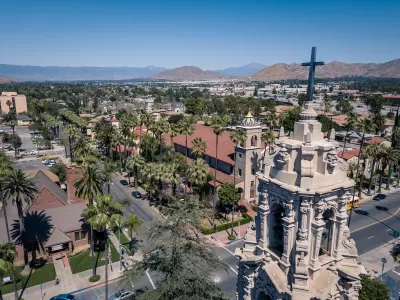The ‘Yes in God’s Backyard’ movement brings together powerful partners to develop housing in areas where development might otherwise encounter opposition.

Writing in The New York Times, Conor Dougherty describes the growth of the ‘Yes in God’s Backyard’ (YIGBY) movement that is making a small but significant impact on the housing and homelessness crisis in California and elsewhere.
As Dougherty explains, building housing on vacant or underused land can benefit the organizations that own it, too. “In Los Angeles and around the country, faith organizations are often on prime urban land that sits smack in the middle of residential neighborhoods or along major corridors.” Now, “By redeveloping their property into affordable housing, congregations hope to create a stream of rental revenue that can replace declining income and lower membership numbers.”
The passage of SB 4 last year, a bill that allows faith-based organizations to build up to 30 units of affordable housing per acre, made these projects possible in California. “In effect, the bill rezoned a large swath of the state’s low-slung landscape by forcing cities to allow apartment development near single-family homes.”
The YIGBY movement is catching on in other places, with governments in Atlanta, San Antonio, Montgomery County, Maryland, and the state of New York passing or considering similar legislation.
FULL STORY: What Would Jesus Do? Tackle the Housing Crisis, Say Some Congregations.

Planetizen Federal Action Tracker
A weekly monitor of how Trump’s orders and actions are impacting planners and planning in America.

Maui's Vacation Rental Debate Turns Ugly
Verbal attacks, misinformation campaigns and fistfights plague a high-stakes debate to convert thousands of vacation rentals into long-term housing.

Restaurant Patios Were a Pandemic Win — Why Were They so Hard to Keep?
Social distancing requirements and changes in travel patterns prompted cities to pilot new uses for street and sidewalk space. Then it got complicated.

In California Battle of Housing vs. Environment, Housing Just Won
A new state law significantly limits the power of CEQA, an environmental review law that served as a powerful tool for blocking new development.

Boulder Eliminates Parking Minimums Citywide
Officials estimate the cost of building a single underground parking space at up to $100,000.

Orange County, Florida Adopts Largest US “Sprawl Repair” Code
The ‘Orange Code’ seeks to rectify decades of sprawl-inducing, car-oriented development.
Urban Design for Planners 1: Software Tools
This six-course series explores essential urban design concepts using open source software and equips planners with the tools they need to participate fully in the urban design process.
Planning for Universal Design
Learn the tools for implementing Universal Design in planning regulations.
Heyer Gruel & Associates PA
JM Goldson LLC
Custer County Colorado
City of Camden Redevelopment Agency
City of Astoria
Transportation Research & Education Center (TREC) at Portland State University
Jefferson Parish Government
Camden Redevelopment Agency
City of Claremont





























